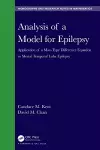
Analysis of a Model for Epilepsy
2 authors - Hardback
£160.00
Since age seventeen, Candace M. Kent has had an intense interest in mathematical neuroscience, including the mathematical modeling of psychiatric and neurological disorders, adult neurogenesis, and ethology. In pursuit of this interest, she earned a B.A. in mathematics and molecular biology in 1979. She later enrolled in a graduate program in discrete dynamics at the University of Rhode Island, and earned an M.S. in mathematics in 1993 and a Ph.D. in mathematics in 1998. In between, while searching for the appropriate path to take for an eventual career in mathematical neuroscience, she attended the following universities:
Consequently, she began her career late in life{in her early 40's as an Assistant Professor of Mathematics and Applied mathematics at Virginia Commonwealth University from 1998 to 2004. She was appointed Associate Professor from 2004 to 2018. She has been Associate Professor Emerita from 2018 to present, after taking early retirement because of ongoing family illness. During this relatively short time in her career, she has published forty-two peer-reviewed articles, all on a diversity of topics in difference equations and systems of difference equations (and some with applications to biology), including autonomous and nonautonomous reciprocal max-type difference equations. Post medical school, Candace Kent has been fortunate in having the skills to assimilate information in medical journals and books, especially in psychiatry and neurology.
David M. Chan earned a B.S. in Aerospace Engineering from Syracuse University in 1991. He then earned a M.A. in Mathematics at the University of Maine in 1994, and a Ph.D. in Applied Mathematics with a minor in Biomathematics from North Carolina State University in 1999. He is currently an associate professor at Virginia Commonwealth University. Using dynamical systems he models and studies problems that arise in medicine, epidemiology, ecology, and social/support networks.